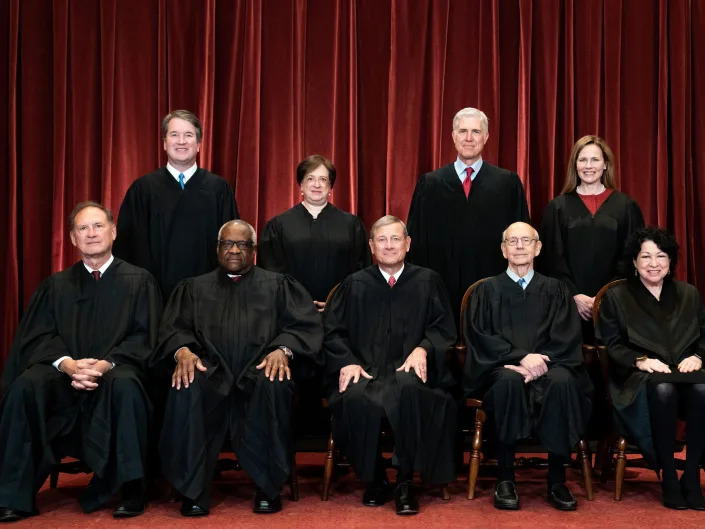Israeli settlers at risk of losing special West Bank status


IsraA section of the West Bank Jewish settlement of Efrat, seen on Thursday, June 9, 2022. Israeli settlers in the occupied West Bank may soon have a taste of the military rule that Palestinians have been living under for 55 years. A looming end-of-month deadline to extend legal protections to Jewish settlers has put Israel’s government on the brink of collapse and drawn widespread warnings that the territory could be plunged into chaos. (AP Photo/Maya Alleruzzo)
JOSEPH KRAUSS
Fri, June 10, 2022,
JERUSALEM (AP) — Israeli settlers in the occupied West Bank may soon get a taste of the military rule that Palestinians have been living under for 55 years.
If Israel’s parliament does not act, a special legal status accorded to the settlers will expire at the end of the month, with wide-ranging consequences. Lawyers who live in the settlements, including two members of Israel’s Supreme Court, will no longer be allowed to practice law. Settlers would be subject to military courts usually reserved for Palestinians and would lose access to some public services.
While few expect things to reach that point, the looming deadline has put Israel’s government on the brink of collapse and drawn dire warnings.
“Without this law, it would be a disaster,” said Israel Ganz, governor of the Benyamin Regional Council, a cluster of settlements just outside Jerusalem. “The Israeli government will lose any control here. No police, no taxes.”
For over half a century, Israel has repeatedly renewed regulations that today extend a legal umbrella to nearly 500,000 settlers — but not to the more than 2.5 million Palestinians in the West Bank. After failing to pass on Monday, the bill will be brought for another vote in the Knesset next week in a last-ditch effort to save the governing coalition — and the legal arrangement.
The law underpins separate legal systems for Jews and Palestinians in the West Bank, a situation that three major human rights groups say amounts to apartheid. Israel rejects that allegation as an attack on its legitimacy.
“This is the piece of legislation that enables apartheid,” said Jessica Montell, director of the Israeli human rights group HaMoked, which provides legal aid to Palestinians.
“The whole settlement enterprise depends on them enjoying all the rights and benefits of being Israelis even though they are in occupied territory.”
An overwhelming majority in the Knesset support maintaining the separate systems. The main reason the bill didn’t pass was that the nationalist opposition — which strongly supports it — paradoxically refused to vote in favor in an attempt to bring down Israel’s broad-based but fragile coalition government. In a similar vein, anti-settlement lawmakers voted in favor of the legislation to keep the coalition afloat.
Israel captured the West Bank in the 1967 Mideast war and has built more than 130 settlements there, many of which resemble small towns, with apartment blocks, shopping malls and industrial zones. The Palestinians want the West Bank to form the main part of their future state. Most countries view the settlements as a violation of international law.
Israel refers to the West Bank by its biblical name, Judea and Samaria, and considers it the heartland of the Jewish people. Prime Minister Naftali Bennett supports settlement expansion and is opposed to Palestinian statehood. Israel officially views the West Bank as disputed territory whose fate is subject to negotiations, which collapsed more than a decade ago.
The emergency regulations, first enacted in 1967 and regularly renewed, extend much of Israeli law to West Bank settlers — but not to the territory itself.
“Applying the law to the territory could be considered as annexing the territory, with all the political consequences that Israel did not want to have,” said Liron Libman, a research fellow at the Israel Democracy Institute and a former top Israeli military prosecutor.
Failure to renew the bill by the end of this month would have far-reaching consequences.
The Israel Bar Association requires lawyers and judges to reside in the country. Without the law’s carve-out, settlers would not be able to practice law in Israeli courts. That would include two Supreme Court justices, one of whom recently upheld an order to forcibly relocate hundreds of Palestinians.
The bill's lapse could also result in more settlers who run afoul of the law being tried in military courts — something Israel authorities have long tried to reserve for Palestinian suspects.
The settlers could lose their ability to use national health insurance for treatment inside the West Bank, and the ability to update their status in the population registry and get national ID cards — something routinely denied to Palestinians.
The law also provides a legal basis for Israel to jail thousands of Palestinians who have been convicted by military courts in prisons inside Israel, despite international law prohibiting the transfer of prisoners out of occupied territory. The law’s lapse could force Israel to move those prisoners back to the West Bank, where there is currently only one Israeli prison.
The various consequences are seen as so catastrophic that many Israelis expect the bill to pass or the government to be replaced. It’s also possible that Israeli authorities, who often bend to the settlers’ demands, will find workarounds to blunt the worst effects.
“I’m not worried,” said Ganz, the settler leader. “It’s like when you owe the bank 1 million dollars, you are worried about it, but when you owe 1 billion, the bank manager is worried.”
Asked if the separate legal systems amount to apartheid, Ganz said: “I agree with you, 100%.”
His preferred solution is that Israel annex what’s known as Area C, the 60% of the West Bank where, under interim peace accords, Israel already exercises complete control. Area C includes the settlements, as well as rural areas that are home to some 300,000 Palestinians, according to the U.N.
Most Palestinians live in Areas A and B — scattered, disconnected population centers where the Palestinian Authority exercises limited self-rule.
“It’s strange that different populations in the same area have different laws,” Ganz said. “So we have to bring Israeli law to everyone here in Area C.”
Two years ago, Israel’s then-prime minister Benjamin Netanyahu flirted with annexation before putting it on hold as part of an agreement with the United Arab Emirates to normalize relations.
The Palestinians, and much of the international community, view annexation as a violation of international law that would deal a fatal blow to any hope for a two-state solution, still widely seen internationally as the only way to resolve the Israeli-Palestinian conflict.
Netanyahu, now opposition leader, and his allies strongly support the West Bank bill but hope its defeat will speed his return to power. The coalition cannot pass it on its own because a handful of lawmakers — mainly Palestinian citizens of Israel — refuse to vote for it.
The law may have been designed with an eventual partition in mind. But many Palestinians see its longevity as proof that Israel was never serious about a two-state solution.
“They could have easily undone the occupation by just not passing this law, time and again,” said Diana Buttu, a Palestinian lawyer and former adviser to the Palestinian Authority. “It gets passed by the left and it gets passed by the right. That’s why this idea of two states is such a fiction.”
Associated Press reporter Alon Bernstein in Jerusalem contributed to this report.










